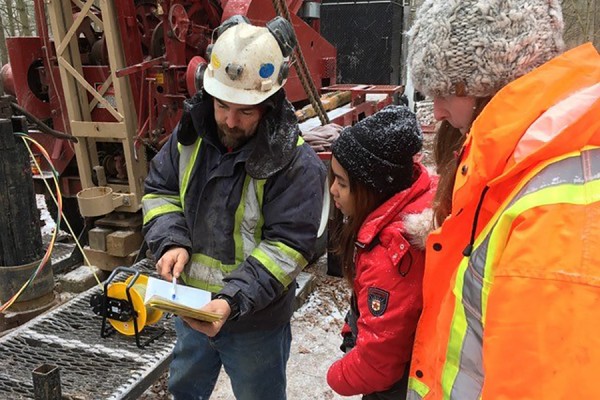 Driller Johnny H. Wilson makes a point to students Jezel Gicole and Sandra Reaume, on site to watch him dig a well for the Normandale Fish Culture Station.
Driller Johnny H. Wilson makes a point to students Jezel Gicole and Sandra Reaume, on site to watch him dig a well for the Normandale Fish Culture Station.
Fourth-year undergraduates taking professor Joel Gagnon’s course Contaminant Hydrogeology got a unique opportunity this winter to learn about water well drilling operations when they watched a network of wells being constructed at a provincial fish hatchery.
The earth and environmental sciences professor says it easy to underestimate the knowledge and expertise required to construct a high-quality, high-yielding well.
“You need the knowledge of a mechanic, a geologist, a hydrologist, and an engineer,” says Dr. Gagnon. “You can learn about this in class, but there’s nothing like going into the field to truly understand the depth and breadth of knowledge that true well drillers possess — so this was a great opportunity.”
The students toured the Normandale Fish Culture Station site, the oldest and largest operating fish hatchery in the province, located near Turkey Point. New wells were installed when the hatchery went through a recent expansion, but Gagnon says the wells were installed improperly and too close together, resulting in limited water supply as well as water contamination.
“These wells cost tens of thousands of dollars and require multimillion dollar machinery, but it is all down to the well driller,” he says. “An expert driller can make a marginal site exceptional and get a remarkable yield out of a shallow well.”
Johnny H. Wilson, a fifth-generation driller with J.B. Wilson & Son Well Drilling Ltd and a graduate of UWindsor’s environmental geoscience program, invited the students to the dig and let them participate in a step test, one of the well sustainability tests mandated by the Ministry of the Environment and Climate Change.
Gagnon says even with the current move away from using residential water supply wells in many areas, well digging is a valuable skill for installing environmentally responsible geothermal heating, where water is circulated from the ground to heat homes in the winter and cool them in the summer.
